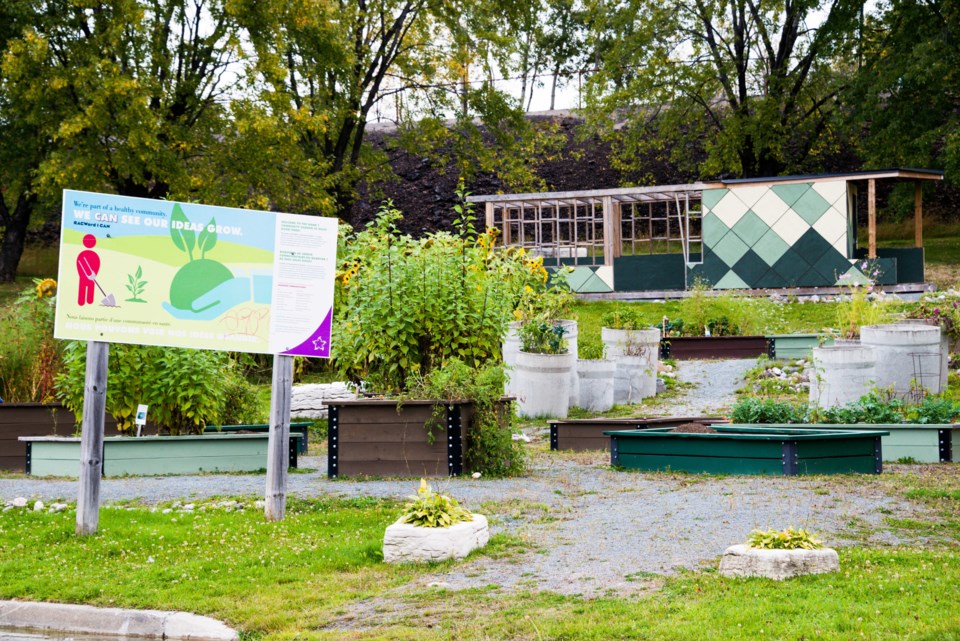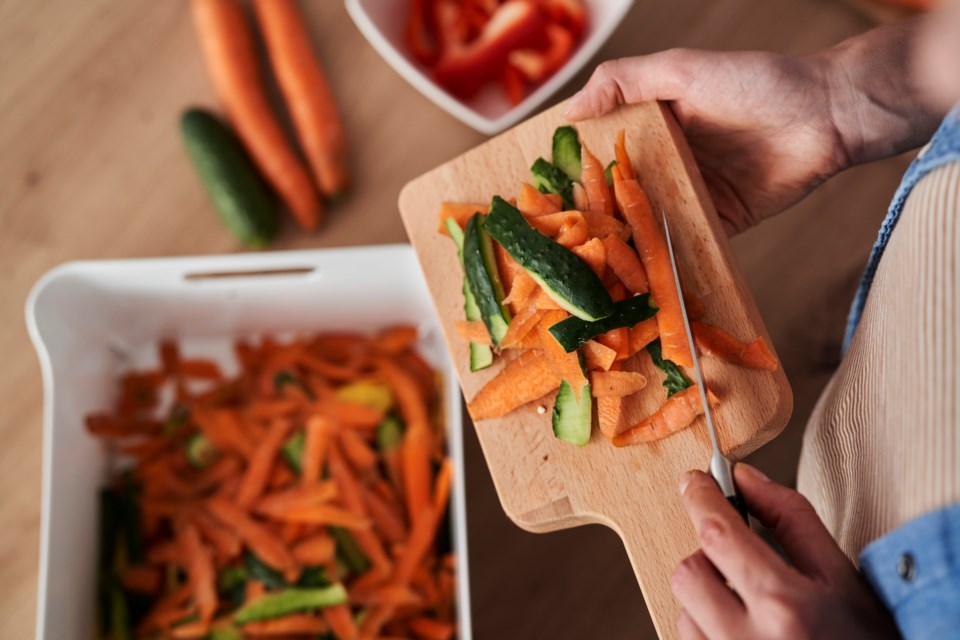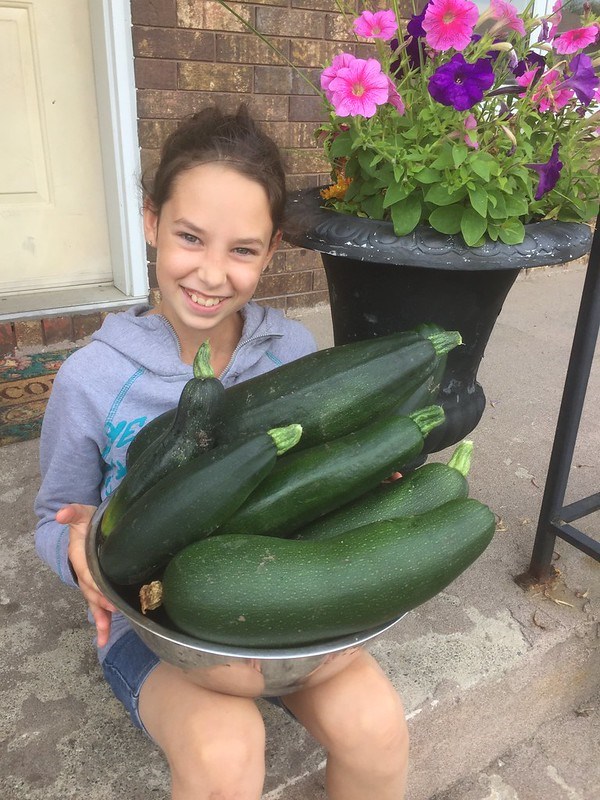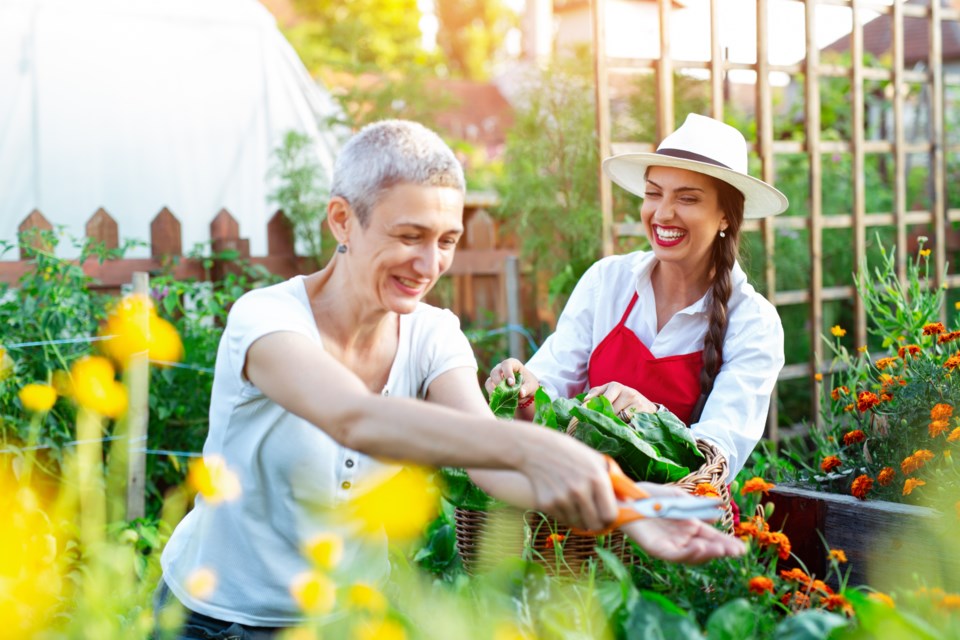With April showers, come May flowers….and eventually nuts, fruits and vegetables.
If you haven’t started your plants indoors, May is a great time to begin planning your garden.
There are many options for gardening for all sizes of space:
- balcony,
- windowsill,
- backyard,
- front yard
- or community garden bed.

Gardening has many benefits that are connected to our community’s climate change action.
Gardening is great for our own wellness, and also contributes to our community’s climate change action and our goal to reach net zero greenhouse gas emissions by 2050. Did you know that 25-30% of the world’s emissions are attributable to our food systems?
Climate Change Mitigation (reducing our greenhouse gas emissions)
The food you eat and grow can help reduce your carbon footprint!
- Grow your own food or buy local to reduce your food kilometers. You can calculate your food kilometres through webpages such as www.foodmiles.com.
From this calculator, one tomato traveling 733km would emit 132 kgCO2. This is a very rough estimate and does not account for many factors, but it can help you think about where your food is coming from. By making a salad with your own tomatoes, lettuce, red pepper, onion, cucumber etc., how many GHG emissions would you avoid?
- Use plants to protect your home from elements. Gardens can also include trees that help make your home more energy efficient. Larger trees and shrubs can be appropriately oriented to act as wind breaks and shade. This keeps your home warmer in the winter and cooler in the summer so you can use less energy.
- Choose plants that don’t require as much watering. The water that comes from your tap and garden hose uses a lot of energy to pump and treat. You can use xeriscaping (choosing drought tolerant plants) and choose native plants to reduce water requirements. Native plants have adapted to live without additional watering. For ground cover, clover doesn’t require much water or mowing and it fixes nitrogen and brings nutrients to the other plants around it. Fruit trees and shrubs also require very little watering once they are established (after the first year) due to their deep roots.
- Buy local plants and seeds. Some of Greater Sudbury’s garden centres grow their plants from seeds and some even collect native seeds from our regional forests and green spaces. Examples are Northern Wildflowers, Southview Greenhouse Growers and Laurett Garden.
You should also make sure you choose non-invasive species. Use the “Grow Me Instead: Guide for Northern Ontario” to avoid problems with invasive species that may be sold through garden centres. The guide can be found online, under “Resources”.
Did you know that the Greater Sudbury Public Library Main Branch has a seed catalogue? You just need to use your library card and you can pick up free seeds!
Climate Change Adaptation (preparing for climate change events such as flooding, extreme heat, drought, wind)
You can make your property more resilient to climate change:
- Plant a rain garden. A rain garden can simply mean a sunken garden strategically placed in an area that tends to pool or drain water on your property. Let the rain do the work for you to water the plants and let the garden help you prevent flooding and runoff. A proper raingarden can absorb up to 30 per cent more water than a flat lawn. Remember that all your gardens can be multi-purpose. For example, a rain garden can also be a pollinator garden and it could also provide food.
- Install a rain barrel. Using a rain barrel to collect rainwater could fall under both mitigation and adaptation. By using rainwater instead of tap water to water your lawn and plants, you are saving energy. Holding a large amount of rainwater to slowly use over time prevents flooding and runoff while providing water during drought periods.
With climate change, there will be more severe or longer lasting weather events. Therefore, a rainstorm may last longer and cause flooding, but a heat wave may also be more severe, causing drought. Rain barrels can address both situations and are an important addition to any property. You can receive a rebate from the City of Greater Sudbury of 50 per cent of the invoiced cost to a maximum of $60 per barrel, with a maximum of two barrels per property, including taxes.
- Learn about Indigenous gardening techniques. Traditional Ecological Knowledge (TEK) refers to the knowledge of Indigenous peoples over generations through direct contact with the environment. We can learn a lot about soils, gardens, medicinal plants and ecosystems through TEK and in turn, learn more about our Indigenous peoples’ cultures and beliefs.
An example of how traditional knowledge is being integrated into gardening is the “Three Sisters” technique. The Three Sisters are corn, beans and squash and they have been an important of Indigenous history for centuries. The technique is not simply about planting them in a row; understanding their ecological needs is the essential component for timing and spacing of the plants. Learn about the Three Sisters to see how they grow together and share nutrients, shade and support. This is yet another, and more holistic, method to reduce watering requirements and provide a more climate change resilient garden.
- Compost. Composting is another element that helps both mitigation and adaptation. It reduces the amount of waste going to the landfill, reduces GHG emissions and provides healthy soil and mulch that helps retain moisture in the garden. There are many benefits of composting, whether backyard composting or participating in the household green cart program through the City.

Participate in your community
There are many opportunities in Greater Sudbury to explore gardening and farming. See the Greater Sudbury Food Access Map to find local farms and community gardens.
How many of these activities can you check off this summer? Experiment and have fun!
- Visit or join a community garden (we have over 30 of them!)
- Visit a farm (we have producers of eggs, honey, meat, vegetables, and more!)
- Volunteer (did you know that we have a community farm and a food forest?)
- Donate produce to those in need (find a way to share your bounty!)
- Donate bouquets to charities (your flowers can put smiles on faces!)
- Involve the kids (schools, youth groups and families can all enjoy the benefits of gardening!)

Resources:
- Community Garden Network
- Food access map
- Sudbury Horticultural Society (visit their website or Facebook page)
- Sudbury Shared Harvest
- Global Gardens in N'Swakamok/Sudbury
- Greater Sudbury Food Strategy
If you have a project that you’d like the City to highlight, contact Jennifer Babin-Fenske at [email protected].
